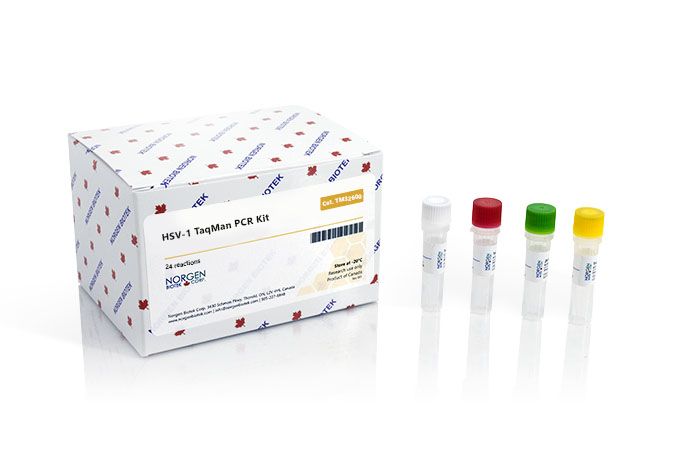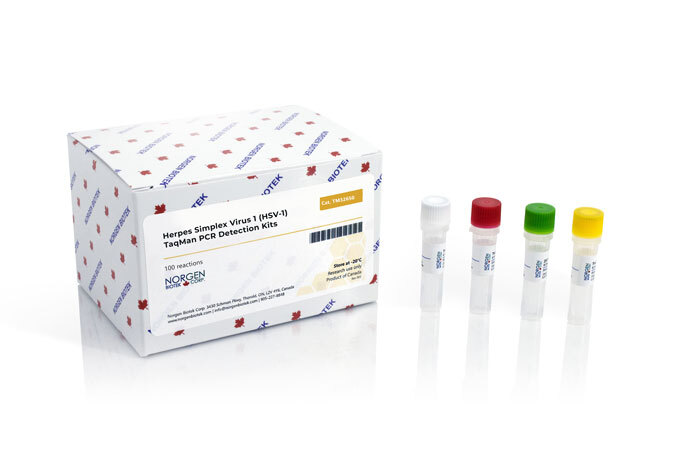Herpes Simplex Virus 1 (HSV-1) TaqMan PCR Detection Kit Dx

Intended for in vitro diagnostics use.
CE marked version is not available for sale in the United States and Canada
Herpes Simplex Virus 1 (HSV-1) TaqMan PCR Detection Kit Dx
Register today to receive an exclusive 15% off* on your first order.
Features and Benefits
- Detection kit for the HSV-1
- CE-IVDD marked in accordance with the European Commission Directive 98/79/EC.
- Research version available
- Available in TaqMan format for analysis
Herpes Simplex Virus 1 (HSV-1) is a member of the herpes virus family, Herpesviridae. HSV-1 has a relatively large double-stranded DNA genome. HSVs are primarily transmitted by sexual intercourse, direct contact with lesions or perinatally. Most HSV positive cases are characterised by lesions on the skins and mucous membranes of the mouth and genitals. HSV infection can be either primary or a recurrence of a previous infection. More than 90% of the primary HSV infections are asymptomatic. Primary infection with HSV-1 can lead to gingivostomatitis, eczema herpeticum, keratoconjunctivitis and encephalitis. The primary symptoms of a secondary infection are skin lesions in the nose, mouth and genital regions. The infection is contagious, mainly during an epidemic.
Click to expand options
- Ready to use format, including Master Mix for the target and PCR control to monitor for PCR inhibition and validate the quality
- Specific Primer and Probe mix for the pathogen/virus/viroid of interest
- Primer and Probe mix
- Positive and negative control to confirm the integrity of the kit reagents
Details
Supporting Data
TaqMan PCR Kit - Figure 1. Example of TaqMan PCR Positive result. Both PCR signals above the baseline from FAM and HEX channel indicate the successful PCR.
TaqMan PCR Kit - Figure 2. Example of TaqMan PCR Negative result. No target DNA was detected in FAM channel but amplification signal from HEX indicates the successful PCR.
TaqMan PCR Kit - Figure 3. Example of TaqMan PCR inhibition result. No signal from both FAM and HEX channel was detected. It is suggested to repeat the sample preparation using recommended kit for DNA purification.
Storage Conditions
The HSV-1 TaqMan PCR Kit Dx is shipped on dry ice. The components of the kit should be frozen upon arrival. If one or more of the components is not frozen when the kit is received, or if any of the components have been compromised during shipment, please contact Norgen Biotek for assistance. All kit components should be stored at -20°C upon arrival. Repeated thawing and freezing (> 3 x) of the Master Mix and Positive Control should be avoided, as this may affect the performance of the assay. If the reagents are to be used only intermittently, they should be frozen in aliquots.
| Component | Cat. DxTM32600 (24 rxns) |
|---|---|
| MDx TaqMan 2X PCR Master Mix Dx | 550 µL |
| HSV-1 Primer & Probe Mix | 2 x 70 µL |
| HSV-1 Positive Control Dx - 200,000 copies/μL | 50 µL |
| Nuclease-Free Water | 2 x 1.25 mL |
| Product Insert | 1 |

